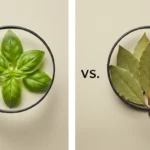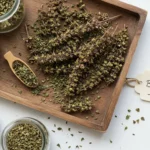Eight years of gardening, and I thought I’d seen it all—until the day my prize-winning basil vanished, leaving only a trail of tiny, tell-tale footprints. Turns out, my feathered friends had developed a taste for the herb. So, the question became urgent: can chickens eat basil, and is it even safe?
Is it just me, or do you also find yourself staring into your garden, wondering what your feathered friends might enjoy nibbling on? I know I do! Lately, I’ve been pondering about basil. That fragrant, leafy herb that I love in my pasta – could it be a tasty treat for my chickens too? If you’re asking yourself the same question, you’ve come to the right place. Let’s dive into the world of chickens and basil, and figure out what’s what.
Is Basil Safe for Chickens? Understanding the Basics
Can Chickens Have Basil? The Short Answer
Alright, let’s cut to the chase. Can chickens have basil? The short answer is a resounding yes! It’s generally considered safe for chickens to eat. I’ve seen my own flock pecking at it with gusto, and it always makes me smile. But, as with anything, there are a few things to keep in mind, which we’ll get into.
Is Basil Toxic to Chickens? Addressing Concerns
Now, you might be thinking, “Okay, it’s safe, but is it really safe?” I get it. We want to be extra careful with our girls. The good news is that basil is not toxic to chickens. It doesn’t contain any compounds that are known to be harmful to them. That doesn’t mean we should let them gorge on it, but a little bit here and there is perfectly fine.
Are Basil Leaves Okay for Chickens?
Absolutely! Basil leaves are okay for chickens. In fact, they’re the part of the plant that chickens tend to enjoy the most. They’re easy for them to peck at, and they’re packed with flavor. I’ve noticed that my chickens seem to prefer the smaller, younger leaves, but they’ll happily munch on the larger ones too.
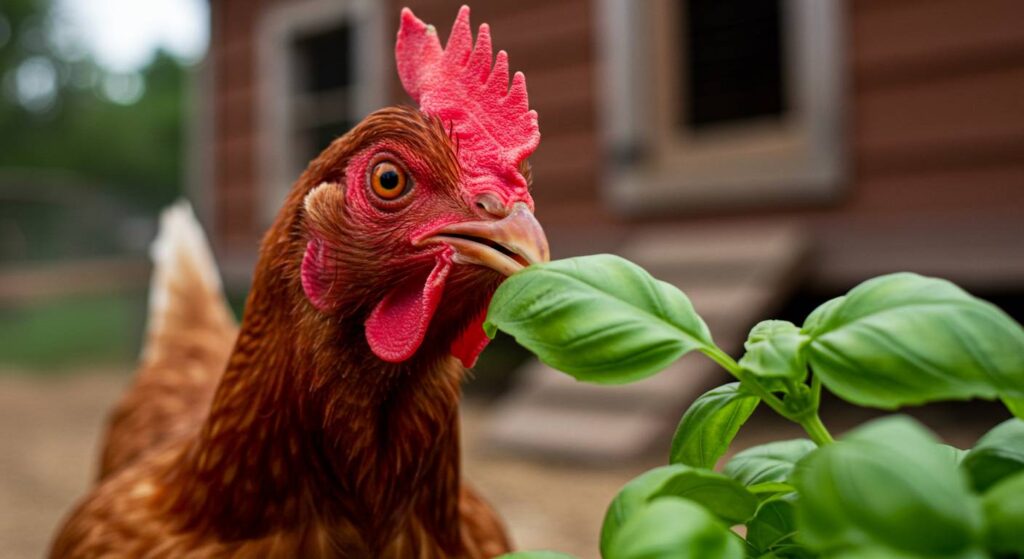
Basil for Chicken Feed: Nutritional Benefits and Considerations
Basil Benefits for Chickens: What Does It Offer?
So, we know it’s safe, but what are the actual basil benefits for chickens? Well, while it’s not a nutritional powerhouse, basil does offer some good stuff. It contains vitamins like A and K, as well as antioxidants. These can contribute to overall health and well-being, and I always appreciate any little boost I can give my flock.
Basil in Poultry Diet: How Does It Fit?
Thinking about basil in poultry diet, it’s important to see it as a supplement, not a staple. It’s not going to replace their regular feed, which is designed to meet all their nutritional needs. Instead, consider it as a tasty and healthy addition, a little something to add variety and interest to their day.
Basil and Egg Production: Is There a Connection?
Here’s a question I often get: Does basil and egg production have any connection? While there’s no direct evidence that basil will cause your chickens to lay more eggs, a healthy and happy chicken is more likely to lay well. The vitamins and antioxidants in basil can contribute to their overall health, which can indirectly support egg production.
Is Basil Good for Chickens? Weighing the Pros and Cons
So, is basil good for chickens? The answer is a qualified yes. The pros are that it’s safe, it offers some nutritional benefits, and chickens generally enjoy it. The con is that it shouldn’t be a major part of their diet. It’s best to see it as a healthy treat or supplement.
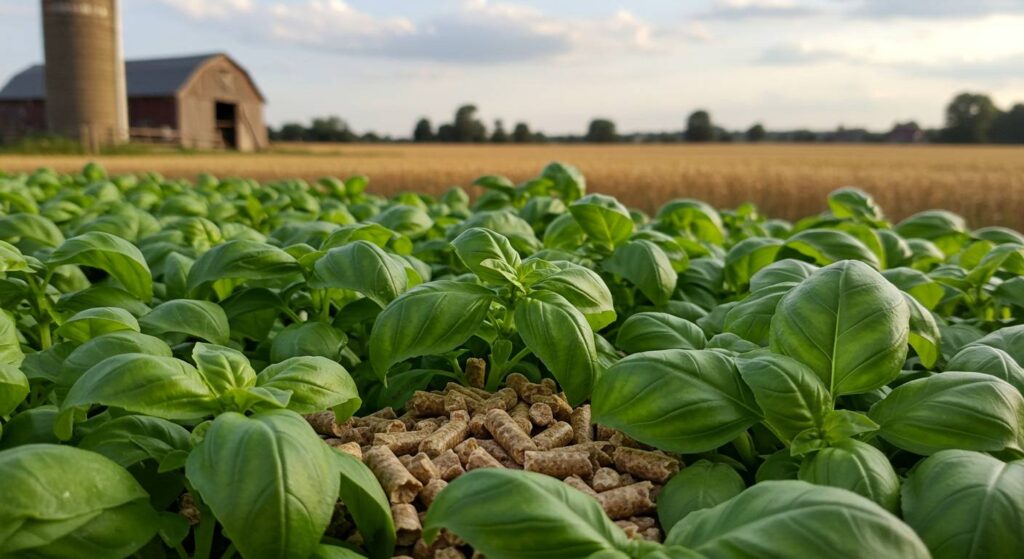
Feeding Chickens Basil: Practical Tips and Guidelines
How to Introduce Basil to Your Chicken Diet
If you’re thinking about introducing basil to your chicken diet, it’s best to do it gradually. Start with a small amount and see how they react. Some chickens might be more enthusiastic about it than others. If they seem to enjoy it, you can slowly increase the amount you give them.
Feeding Chickens Basil: Fresh vs. Dried
When it comes to feeding chickens basil, both fresh and dried options are fine. Fresh basil is often more appealing to chickens because of its aroma and texture. However, dried basil is also a good option, especially in the winter when fresh herbs are harder to come by.
Can Chickens Eat Fresh Basil?
Yes, can chickens eat fresh basil? Absolutely! In fact, fresh basil is often their favorite. The leaves are easy for them to peck at, and they seem to love the taste. I often toss a handful of fresh basil into their run and watch them go to town.
Adding Basil to Chicken Feed: Best Practices
If you want to try adding basil to chicken feed, you can mix chopped fresh or dried basil into their regular feed. This can be a great way to add some extra flavor and variety to their meals. Just make sure it’s not too much, as they still need the balanced nutrition of their regular feed.
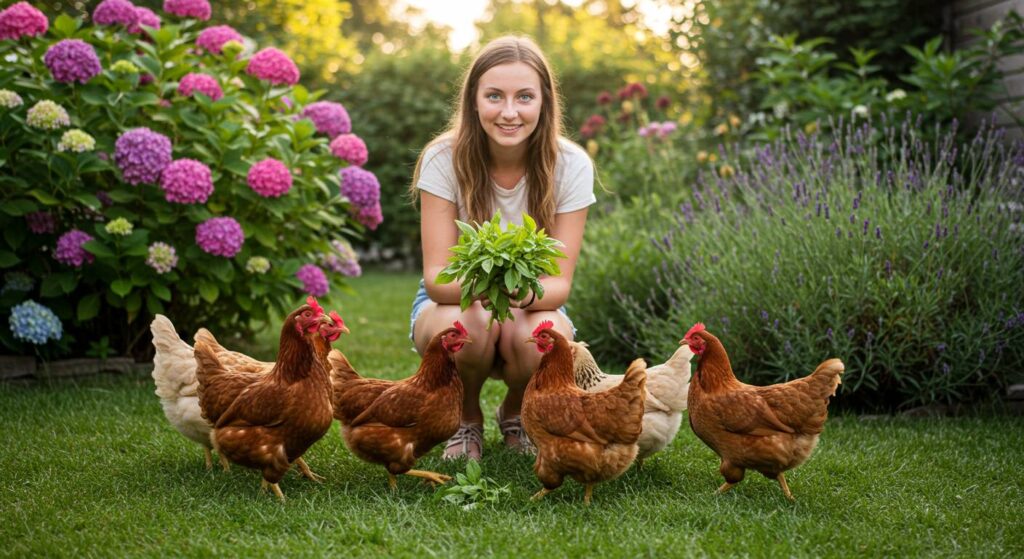
Basil as Chicken Treat: Making It Enjoyable
Do Chickens Like Basil? Understanding Their Preferences
Okay, so we know it’s safe and potentially beneficial, but do chickens like basil? Generally, yes! Most chickens seem to enjoy the taste and aroma of basil. However, like people, chickens have their own preferences. Some might be more enthusiastic about it than others.
Basil as Chicken Treat: Serving Suggestions
Looking for basil as chicken treat serving suggestions? You can simply toss a handful of fresh leaves into their run. You can also hang a bunch of basil from the roof of their coop for them to peck at. Another fun idea is to put some basil in a treat ball or foraging toy.
Chicken Treats Basil: Fun Ways to Feed
I love finding fun ways to feed my flock. When it comes to chicken treats basil, think outside the box. You can freeze basil leaves into ice cubes for a refreshing summer treat, or mix chopped basil with other safe veggies for a tasty salad. The possibilities are endless!
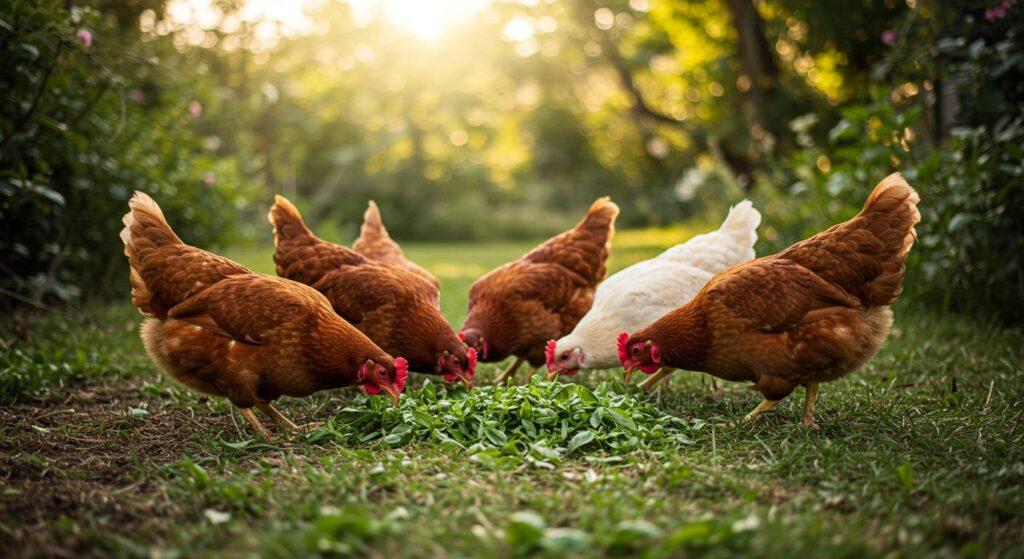
Basil in Chicken Coop and Garden: Considerations
Chickens and Basil Plants: Garden Safety
Now, what about chickens and basil plants in your garden? If you have free-ranging chickens, they might be tempted to nibble on your basil plants. While it’s not harmful for them, they might decimate your plants in the process. Consider fencing off your basil plants or growing them in pots out of their reach.
Chicken Foraging Basil: Encouraging Natural Behavior
I’m a big fan of encouraging natural behavior. Chicken foraging basil can be a great way to do this. If you have a safe area where chickens can roam, you can plant some basil for them to forage on. It’s a fun and enriching activity for them.
Garden Herbs for Chickens Basil: Expanding Their Diet
Thinking about other garden herbs for chickens basil isn’t the only option. There are many other herbs that chickens enjoy, such as mint, oregano, and thyme. Planting a variety of herbs can provide them with a diverse and interesting diet.
Basil in Chicken Coop: Potential Issues
While it’s generally safe, having basil in chicken coop can pose some minor issues. If you’re hanging fresh basil in the coop, make sure it’s not too low, as they might trample on it. Also, be mindful of how much they’re eating, as too much of anything can cause digestive upset.
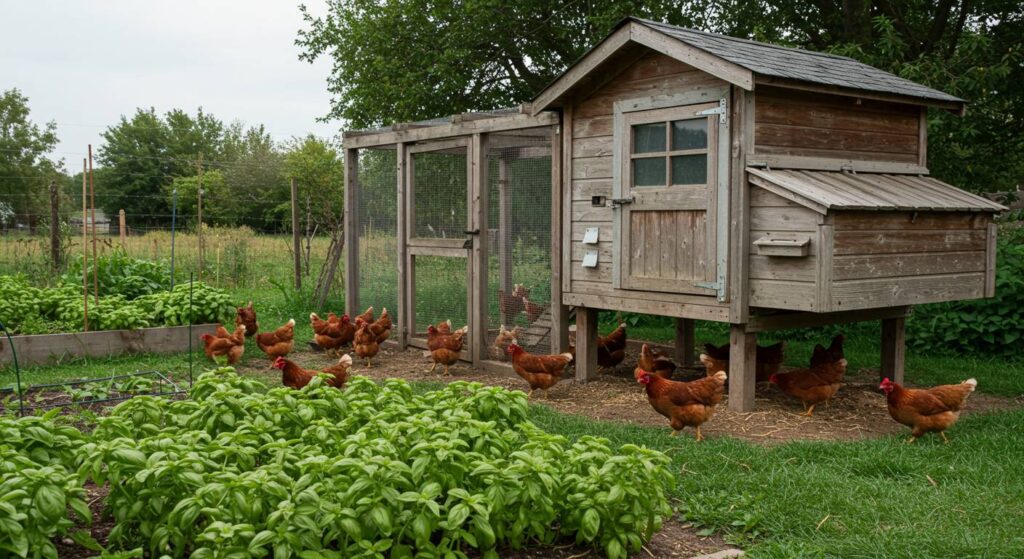
Safe Herbs for Chickens: Basil and Beyond
Poultry Eating Basil: Other Herbs to Consider
If you’re interested in poultry eating basil, you might also be curious about other herbs. Many herbs are safe and beneficial for chickens. Consider adding dill, parsley, and lavender to your garden. These herbs can provide additional nutrients and variety to their diet.
Natural Chicken Feed Basil: Exploring Natural Options
I’m always looking for ways to incorporate more natural elements into my flock’s diet. When it comes to natural chicken feed basil is just one piece of the puzzle. Other natural options include things like weeds, insects, and even kitchen scraps (when safe).
Can Chickens Consume Basil? A Recap
Let’s quickly recap: Can chickens consume basil? Yes, they absolutely can! It’s safe, it offers some nutritional benefits, and most chickens enjoy it. Just remember to offer it in moderation as a supplement to their regular feed.
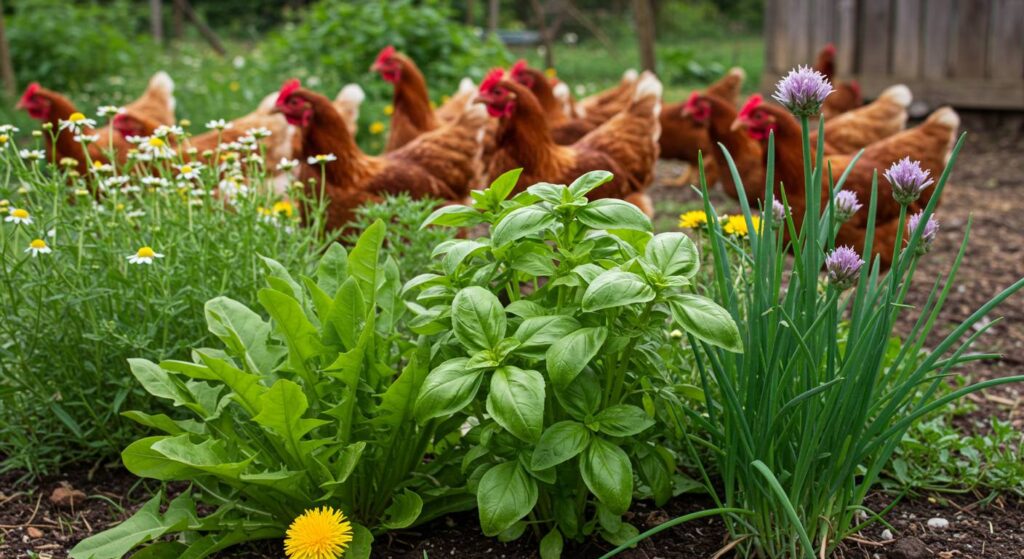
Conclusion: Should You Feed Basil to Your Chickens?
So, after all of this, should you feed basil to your chickens? My answer is a definite yes, with a few caveats. It’s a great way to add variety to their diet, provide some extra nutrients, and make them happy. Just remember to introduce it gradually, offer it in moderation, and be mindful of any potential issues. Happy chicken keeping!
